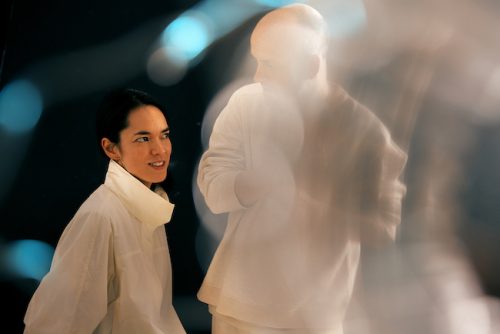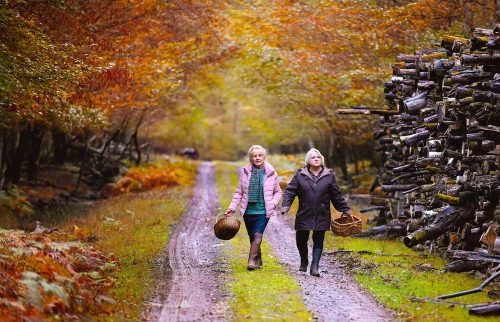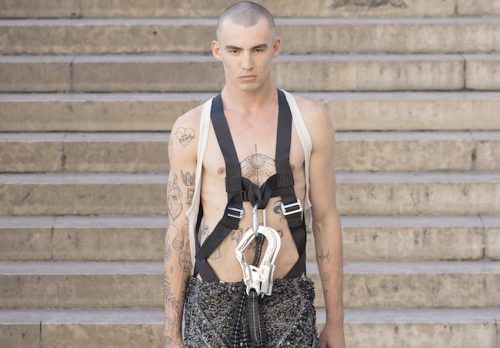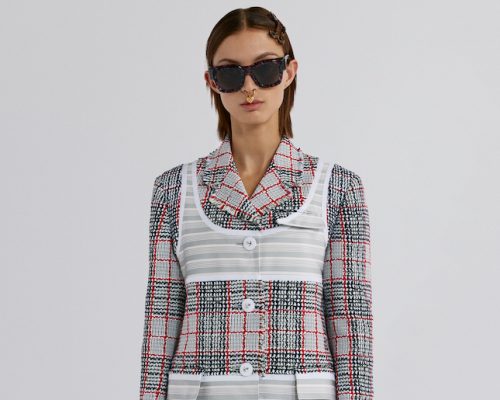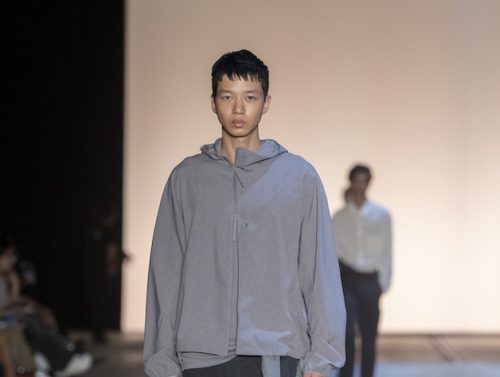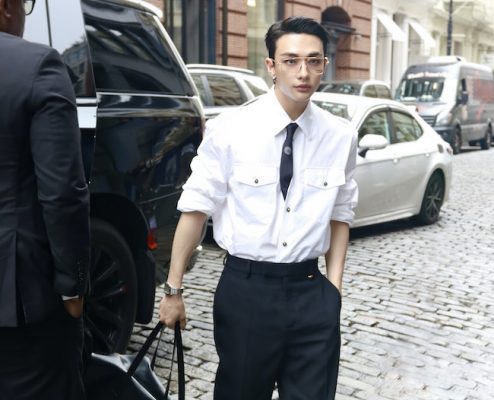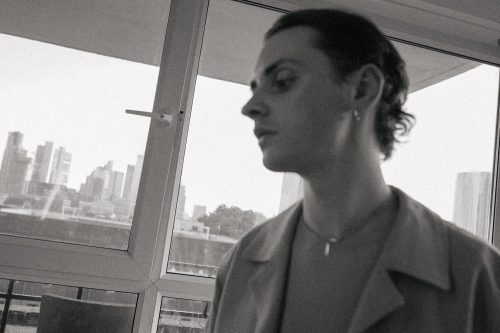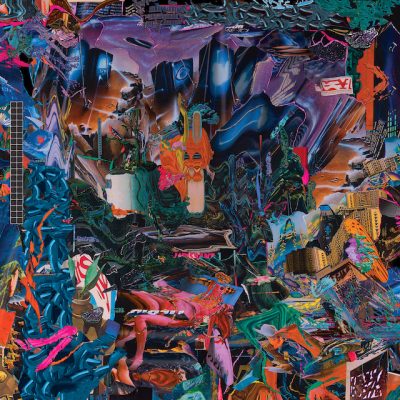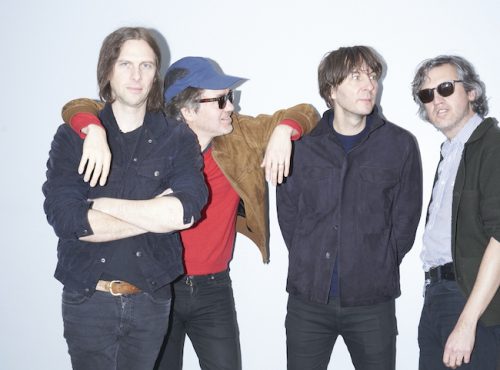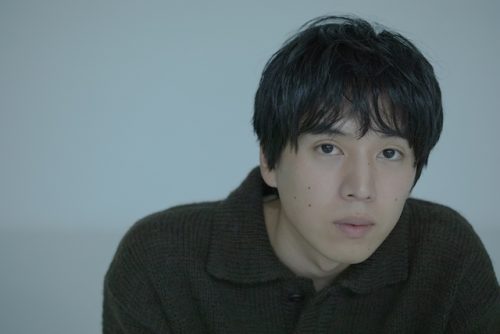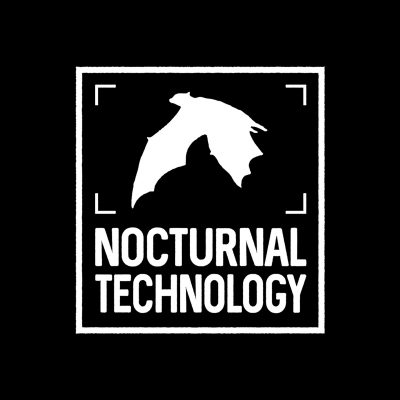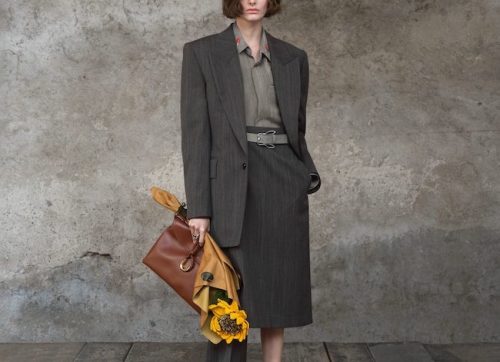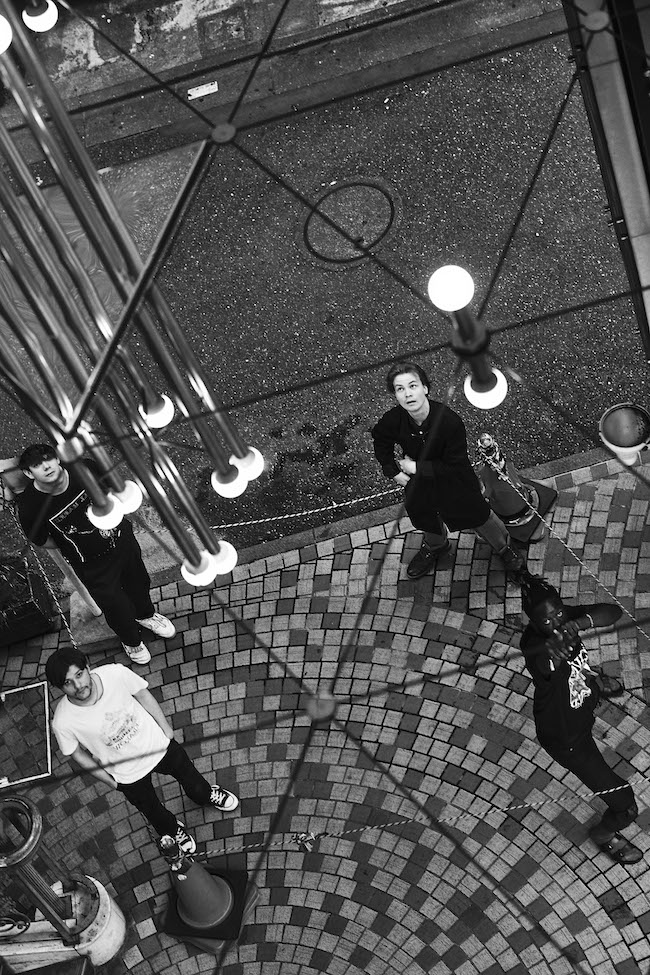
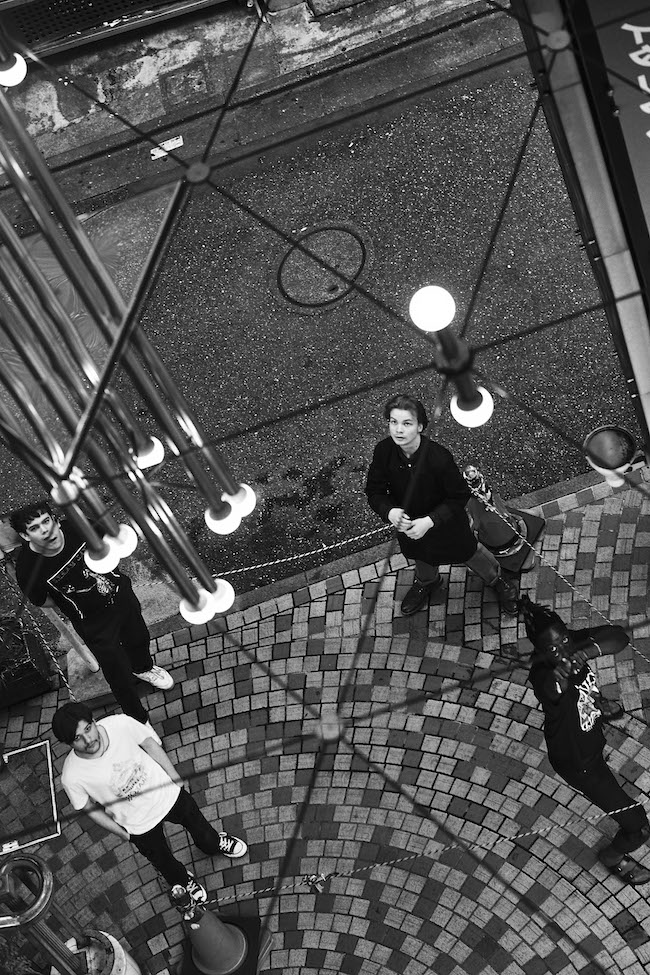
ーーSo Boningen and Black Midi have something in common in which you guys both have worked with Damo Suzuki. So has that experience affected you in your music or the music that you are making at all?
Morgan : I think that it made us more confident in terms of improvising and street live shows. Stuff like that. When we played with him, we were literally thrown into the deep end with no form of direction. We didn’t talk much before the show but what he said was that ‘I’m going to jump but when I land just make noise and see how it goes from there honestly.’ Just generally and personally made me more of a confident musician in general.
Matt : Definitely. There was like a preimposed Black Midi because I think naturally after that gig we started improvising loads in our shows because we obviously saw Damo doing it. Not just in shows but with people who we had never played with before and the people that he met had he not done this really cool thing which is going around and playing with people from that local area. So I would say that that experience has affected us more than we realize in a positive way.
ーーSo maybe you guys had a little training in terms of performance from him. Not training but…
Morgan : Yeah, definitely.
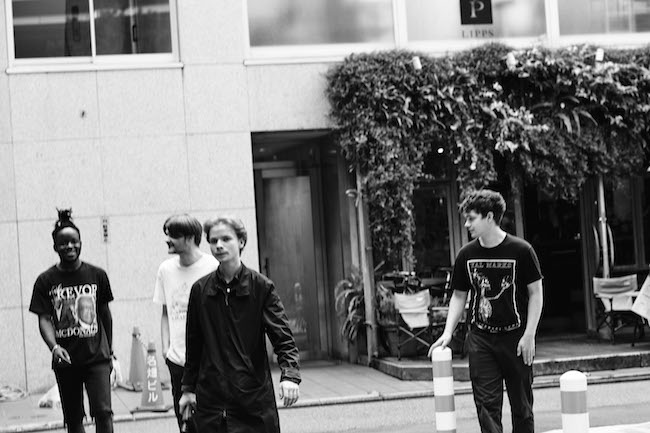
ーーI think when you read news and articles about Black Midi the articles refer to different kinds of genres and artists. Some of it is true but when you listen to Black Midi’s music as a whole, I think it is very unique and very different. So today we are very interested in Black Midi’s music writing process. Are you aware of these reference artists and influences?
Matt : A lot of the bands we get compared to, we haven’t even heard of so it’s kind of interesting in that sense. Because we just end up discovering loads of music through that way. In terms of the writing process I don’t really think we think about other bands and stuff like that. We just get in a room and with a tape recorder and jam for hours and we pick out little bits from those jams and we end up putting them together and developing them like that. But I don’t really think like ‘Oh let’s do something like this band.’ It just comes out naturally
Morgan : I think the whole idea and the fact that we haven’t heard of all of these bands that we are being compared to really does show how influence as a whole is continuous and you can’t necessarily track it. We might not even recognize ourselves that we’re being influenced by a particular thing. It can always translate itself when you’re writing music without you even realizing.
ーーCan you mention a few bands that you have been compared to before and you think you do actually sound like?
Morgan : Battles, Talking Heads I guess because one of our songs is called Talking Heads.
Matt : We’ve been compared to Swans. I think that there are some little aspects that we see.
Morgan : They are like the main three that come to my mind straight away.
Matt : Slint gets mentioned quite a lot but I can see why people mention that a little bit as well.
ーーWhy do you understand that people say those things, that you guys are similar to them?
Matt : Just like some chord percussions and some of the quieter bits are quite similar. But I wouldn’t say that there was a massive influential band on us.
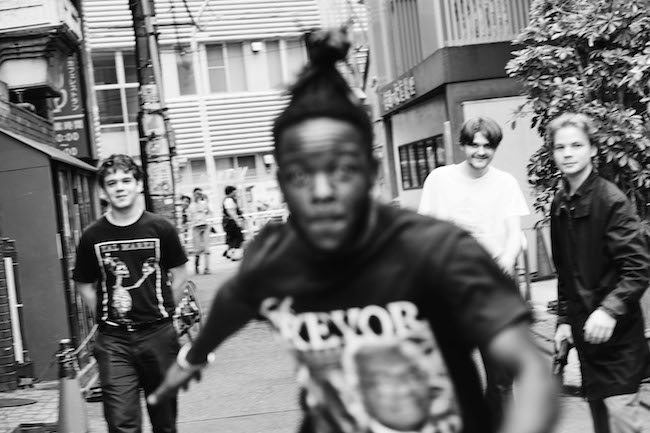
ーーWhen we heard your music we compared it to music from This Heat because they also have this song writing process and the improvisation aspect and the way they blend the two in was kind of similar to what you guys do with the construction and the destruction. How do you feel about that?
Morgan : Yeah we have gotten that a few times before and I think we are quite similar in that way.
Matt : It’s just an easy and productive way of writing so that’s quite interesting.
ーーWe want to ask about the album now. It’s been quite some time since the album was released and you’ve been touring for a while now so maybe you had some time to look back on the work that you released. Any new discoveries or new thoughts about the record?
Morgan : I think now that the dust has settled, I guess we can see how it’s been received by people which is a lot better than what we thought it could have been. We definitely wouldn’t have thought a year ago that a year later we would be here in Japan playing two sold out shows. I think individually, it’s probably different for everyone but I think the main thing is that we are all happy that there’s a piece of work out and we’ve laid down a marker. So now we can continue pursuing whatever whereas before it was like before music was out it was harder for people to get what we were about but now there’s actually a piece of work out and we can just continue. Not necessarily in that same lane but now we’ve got the first bit out,we can just keep going, really.
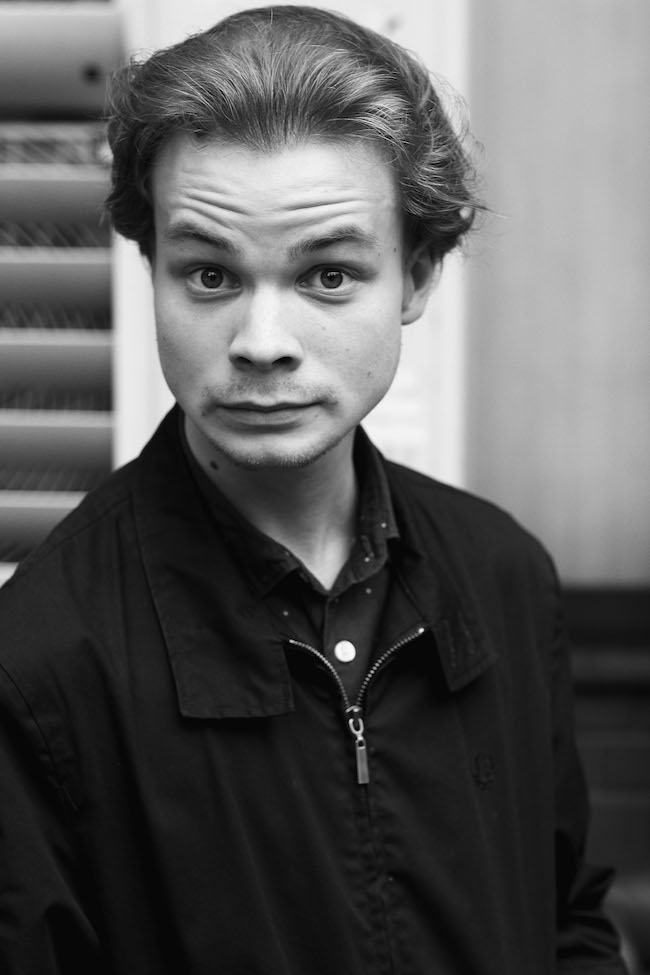
ーーYou guys have all kinds of different songs and even within the songs you have different percussions and development. Was there anything that you guys cared about and considered important when you were making the record or any challenges?
Morgan : I guess what we found important was making the songs interesting whether with instrumentations, sonics within those instruments, what they were doing with the pedals or how I’m playing the drums. Structurally as well. There were different structures within the songs. Structure is a big thing for us. Because naturally if a structure is not the norm, then it will catch your ear. For example like Frank Zappa and that kind of thing like Captain Beefheart which we have been compared to sometimes. It’s just captivating. Just purely in the way the song travels. So I think structure is a really important thing. Lyrics as well. Every individual aspect we all care about but at the same time we don’t deeply think about it. It’s just like let’s just try and make it interesting and I think we have an ability to make things happen in a natural process.
Matt : It’s just an emphasis on how we make it interesting for ourselves as well. Because it is important to feel connected to the music as well. We’re not too interested in whether people like it or not. One thing we found important when making the record was just trying to separate from the live experience. Having loads of different instrumentations that we wouldn’t have been able to do live just between the four of us. But we found it hard to translate the energy in live shows into a record.
Morgan : Along the same lines within music, live and studio are two different products so it wouldn’t make sense to treat them like they were the same thing. But definitely the whole thing about translating the energy to the studio was such a big factor because that there are so many records that do it well but it is hard to do. We actually wanted to take the music into a different space. We hadn’t actually been in a studio environment that much before we had recorded the album. So I would say we probably spent about 8 or 9 days in a studio setting with just us four which isn’t really that much. So I think we had adapted really well but a lot of that is down to Dan Carey the producer. How he’s just cool and super easy to work with. His studio is super suitable for the way we work. By that I mean really spontatious about adding different things here and there. And he could just set up a mic and record it in seconds. Whereas other places would be faffing around and ‘Let’s get the mic set up and let’s get it plugged in and…’ by that time the idea doesn’t feel feel anymore so.
Matt : It’s when they talk about whether to put a random instrument up on this random part and by the time they’ve finished talking about it, you like feel like you don’t want to do it anymore.
Morgan : You just drained all of the juice out of it. With Dan, there is no ego and that really manifests itself in the way that he doesn’t treat things like they belong to a certain thing. There are some producers who would say ‘Don’t use that instrument because that is for a certain type.’ Whereas Dan and we are just like ‘If it sounds cool then it sounds cool so just do it and put it on.’ The whole recording process was pretty seamless.
Matt : I wouldn’t say that it was challenge. Not at all.
Morgan : There wasn’t one hurdle that we had to overcome. It was a pretty smooth process.
ーーHow has this music of Black Midi developed within you guys? Have you always liked this kind of music or did you grow up listening to that kind of music or in general?
Matt : Well I started listening to music properly when I was nine and started learning the guitar when I was eleven but I wasn’t into this kind of music at the time. That kind of just came from going to the Brit School which is a musical art college. That is when I met Geordie and everyone else. And Geordie introduced me to all different kinds of music and that’s when we started playing together and messing around.
Morgan : I guess for me I started playing when I was two years old. Grew up in church and with
music all around me all of the time. My parent’s played and my uncles and aunties played so for me from a young age I knew that it was music that I was going to do but more on which avenue was it going to be. Fast forward to Brit School, I was going in with the mentality of a pop session musician because that was what I was doing before so that’s what I thought I was going to do. But then I met these guys. Like what Matt was saying but basically I was exposed to all this different kinds of music that I didn’t even know existed and thought I would be exposed to. So I think the whole Brit School environment did change my life and I wouldn’t be here if it wasn’t for the Brit School because it just exposes you and forces you to become open-minded because much of it is about dropping grudges against certain things. If you don’t you are going to miss out on a lot of things. You kind of have to learn to be open-minded. Like Matt was saying we always share music with each other. Geordie showed me a lot of music. Me and Matty chat about music. But it was cool that we all had our own individual relationships. We were all mates before the band. It wasn’t like we were thrown into the mix to become a band and I think the cool thing is that we all have different backgrounds so now it’s like amalgamation because we have our own individual tastes that also influence the way we play and how the band sounds as well.
ーーSpeaking of the Brit School nowadays there are alot of artists like yourselves from the Brit School. But back in the days during the 80s, bands were considered a virtue to not have that professional education. Maybe there were in art and design but they did music. What do you feel about that difference? The different ways of how people get into music.
Morgan : I think it’s interesting but it’s really cool that these things exist now. Because the Brit School is free for everyone and you don’t have to pay if you aren’t that well off you can still enter. It’s not like a privileged school.
Matt : I’m pretty sure that it’s the only free performing arts school in England. I think the environment at the school, there are obviously different courses and we did music but there’s musical theatre, there’s art, there’s dance, there’s broadcasting digital communication (BDC) but I think the really amazing beautiful thing that I found when I went there was that there’s so much cross pollination between those people. So it’s not just like the music people stick to music. You could be an artist within music when you want to make a music video go to your mate in BDC and for artwork go to your mate in art and it’s just this whole melting pot of these young people who are so passionate about what they want to do and have the opportunity to collaborate with people their age which is so important because collaboration is the most important thing about art. Art is about being able to collaborate with people and different kinds of people. I think that was the most special thing about the Brit School. Now we’ve come out of the Brit School and there’s people who did art, dance and now they do music because they had friends who did music and they liked it. There’s just so many different avenues into music which is cool. And other forms of art as well. Just cool because there should never be one way to get into something.
Morgan : It’s interesting because people like to look down on the Brit School because ‘Oh it’s the fame school. Adele went there and Amy Winehouse went there.’ There’s so many interesting things going on at the Brit School and doing really interesting things as well but there’s just media coverage on the big people making that kind of music obviously but it is just a really diverse encultured school.
Matt : That’s another thing. Proper diverse. Because a lot of these institutions are just not diverse.
It goes beyond just music or dance but what the implication of merging a load of different people with different backgrounds can really breed positive results. The same thing about how people look down on the Brit School. I mean I had preconceptions about the Brit School before I went. We all have ideas about a place, or about someone before we know them. You only really know when you try it out.
Morgan : No one knows what it’s going to be like. No one can say what it was like if you hadn’t been there. It’s funny that people are attacking it.
ーーThere are indie bands in Japan that do get professional education these days. What do you think the importance of getting that professional musical training is as opposed to doing it on your own?
Matt : I guess it’s just a really good time to make mistakes and stuff before you actually go out into the real world. In that sense and also for practicing playing with other people. I think that is the most important thing when you are a live performing musician, playing with people.
ーーHow did you get involved in the Wulu project?
Morgan : Pretty weird story. Two years ago, I did a masterclass sort of thing for a charity called Beatroutes and this guy called Spencer runs it and he hit me up because we had worked together before and he was like ‘Want to come down and just chat with some kids about what you do and stuff?’ And Wulu is doing it and Moses Boyd is doing it. So it’s me and Moses Boyd who are doing it and that was where I had met him. And a year down the line I moved to Southeast London which is five minutes away from the studio run by a guy called Quake and that was essentially how it got going. There’s a lot of people in South East London within that area so yeah that’s Wulu.
Matt : There nice guys as well.
photography Yosuke Torii
text Junnosuke Amai
edit Ryoko Kuwahara
